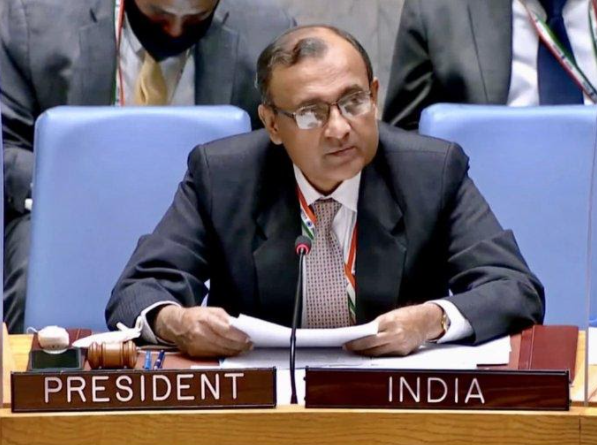NEW DELHI: The Taliban claim to have captured their first provincial capital in Afghanistan after U.S. President Joe Biden announced the withdrawal of foreign troops on April 14. The reported fall of Zaranj, capital of the southern Nimroz province, is symbolic and significant. It’s the main land route connecting Iran’s Chabahar port with Afghanistan and Tajikistan. In 2009, India finished construction of the Zaranj-Delaram road that connects Iran with Afghanistan’s ‘Garland Highway’, with access to the four major cities of Herat, Kandahar, Kabul and Mazar-e-Sharif.
 Commanding General 215 Maiwand Afghan Army Corps Sayed Sami Sadat leading the battle in the south and west. (Photo: @215Corps)
Commanding General 215 Maiwand Afghan Army Corps Sayed Sami Sadat leading the battle in the south and west. (Photo: @215Corps)
“It’s the last thing the Iranians want to see—the Taliban take over territory near their border,” Kamran Bokhari, Director, Analytical Development, Newlines Institute in Washington, D.C. and National Security and Foreign Policy Specialist at the University of Ottawa’s Professional Development Institute said on StratNews Global’s ‘Talking Point’, adding, “the battlespace dynamics is very different from what’s being discussed in political and diplomatic meetings.”
One of those meetings, a UN Security Council (UNSC) special session called under India’s rotational presidency, was held on August 6, even as the Taliban also claimed responsibility for assassinating Dawa Khan Menapal, the chief of the Afghan government’s press operations and former deputy spokesman for President Ashraf Ghani.
 India’s Ambassador TS Tirumurti at the UNSC special session. (Photo: UN Photo/Manuel Elías)
India’s Ambassador TS Tirumurti at the UNSC special session. (Photo: UN Photo/Manuel Elías)
“One can notice a sense of disappointment at the weak actions by the UNSC,” former Indian Ambassador to Afghanistan Amar Sinha told StratNews Global, adding, “The situation in Afghanistan is dire and pious declarations, however well meaning, will not do. Tough measures are needed. The international community cannot reduce itself to being a mute spectator of an unfolding genocide. Action is needed not only against the Taliban but also against its backers so that the supply chains that are sustaining the Taliban offensive is cut. Pressure on the Taliban alone without bringing their mentors to account will not work.”
“Menapal’s assassination,” he said, “is in line with the Taliban’s plan of targeted killings aimed at silencing all independent and voices that are critical of the Taliban and Pakistan. Government officials and supporters, media persons, judges, students and even clerics are being silenced brutally. Many women journalists have been forced to quit their jobs. The Taliban is imposing radio silence on areas controlled by it so that no account of its atrocities and barbaric violence gets reported.”
 UN envoy & SRSG Deborah Lyons briefs the Security Council special session on Friday. (Photo: @UNAMA)
UN envoy & SRSG Deborah Lyons briefs the Security Council special session on Friday. (Photo: @UNAMA)
At the UNSC, Deborah Lyons, the Secretary General’s Special Representative (SRSG) and head of the United Nations Assistance Mission in Afghanistan (UNAMA) called for the Council and the regional and international community to “demonstrate the commitment to prevent Afghanistan from descending into a situation of catastrophe so serious that it would have few, if any, parallels in this century” in a “different kind of war, reminiscent of Syria recently or Sarajevo in the not-so distant past.” To put more pressure on the Taliban, she proposed the travel ban exemption, which comes up for renewal on September 20 “must be predicated on real progress on peace.” India is also chair of the 1988 Taliban Sanctions Committee.
 India’s Ambassador TS Tirumurti presides over the UNSC special session. (Photo: @ambtstirumurti)
India’s Ambassador TS Tirumurti presides over the UNSC special session. (Photo: @ambtstirumurti)
In his statement to the UNSC, Ambassador T.S. Tirumurti, India’s Permanent Representative to the UN, reiterated Delhi’s support for “a leading role for the United Nations and call(ed) on the Secretary General to take an initiative towards finding a lasting and durable outcome,” emphasising that Taliban “violence and military threat cannot be used to strengthen the negotiating position.”
 Afghan Ambassador to the UN Ghulam Isaczai at the UNSC special session. (Photo: @G_Isaczai)
Afghan Ambassador to the UN Ghulam Isaczai at the UNSC special session. (Photo: @G_Isaczai)
Afghanistan’s Ambassador to the UN Ghulam M. Isaczai asked the “Council to use existing tools, including the effective implementation of the sanctions regime under resolution 1988 and UN Security Council resolution 2513, to pressure the Taliban to engage in meaningful peace talks with the Government negotiating team.”
As UN SRSG, Deborah Lyons warned: “We… must put aside our own differences… and send a strong signal—not only in our public statements but also in our bilateral communications with both parties—that it is essential to stop fighting and negotiate, in that order. Otherwise, there may be nothing left to win.”
The 'Eye' of the story not the 'I' of the story. That's Amitabh Pashupati Revi's credo from the beginning of his professional journey in 1995. From conflicts in the war zones of Afghanistan, Syria, and Iraq to nuances of international politics in the Maldives,Thailand, and South Sudan, Amitabh has reported from all the world's continents, except for Antarctica(so far). Though, he has documented the world's third pole, the Siachen Glacier!
Amitabh reports and produces documentaries on the two-front China-Pakistan threat to India. His ground reports from Arunachal Pradesh and Ladakh have received viewership in the hundreds of thousands. Amitabh has interviewed world leaders, top global analysts, and experts in India, Russia, the United States, and Australia as well. Along the way, he’s picked up the Russian language, the Ramnath Goenka Award for his reporting on the 'Islamic State' terrorist group in Iraq, the Khaled Alkhateb Award for his reporting from Palmyra, Syria, and the UN Dag Hammarskjöld Distinguished Journalist Fellowship. Last but not least, as a founder member of StratNews Global, Amitabh helps lead the reporting, editorial, production, and administration teams at StratNews Global, BharatShakti, and InterStellar on their journey ahead.





